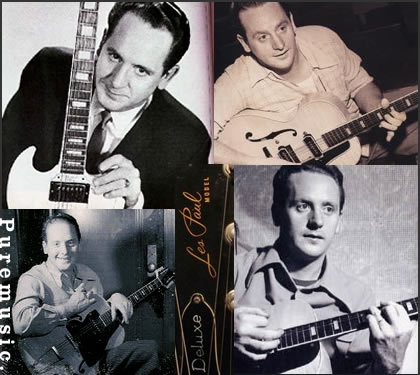
A Conversation with Les Paul (continued)
PM: Having played music your whole life, what would you say is the most difficult aspect of your job?
LP: I've talked to some of the greatest players on earth. I've asked them "What's the toughest thing for you in music?" and I get the same answer. It's to play slow, or to play with feeling. That's hard to do. Count Basie, the longer he was alive, the less notes he could play, because of his illness. The less notes he played, the more he thought about playing the right note. The last time he performed, at the Grammy Awards, I was there. He was in a wheelchair, and we helped him up onto the ramp and got him to the piano. He put his left hand up, and he counted the band off, and they're playing like crazy. All of a sudden they break, and he hits one note. And I thought, "God almighty, that's the best note I ever heard" [laughs]
PM: What contemporary guitarists do you admire?
LP: There are so many great players, and I surely wouldn't want to leave one out. But there are certain ones that I admire greatly. Jeff Beck is excellent. Tommy Emmanuel is great. I can listen to Segovia and get knocked out. I can listen to Jimi Hendrix and get knocked out. It's a very wide span.
PM: You were apparently one of the first to discover Hendrix. Is that true?
LP: In 1965, I was on my way to New York with a Simon and Garfunkel master that I had to return to Columbia. We were driving down Rt. 46, my son and I, and I stopped at this saloon where I sometimes performed. I needed to talk to the manager for a minute. It was the afternoon, and there was a guy on the stage, all by himself, left-handed, playing the hell out of his guitar. Real raunchy. I got back in the car and said to my son, "There's a crazy guy in there playing guitar. He's real good." I said, "We'll stop on the way back so you can hear him." When we got back, I asked the bartender, "Where is the crazy guy with the guitar?" The bartender said, "He was too loud. We threw him out." I said, "What's his name?" The bartender didn't know. He wasn't using the name Jimi Hendrix. It was Maurice James. So I told my manager about it. At the time, I was thinking of getting into management and quitting playing. I had a whole bunch of acts lined up--José Feliciano, Willie Nelson, the Young Rascals. I said, "I'd like to find this guy and manage him. He's really got potential." My manager hunted everywhere. A year passed and he came to me and said, "You know that left-handed guitar player you were talking about? He died in a fire, smoking a cigarette." I thought, "Well, that ends that."
About a year later, London Records asked me to come out of retirement and make one more album. I said, "Okay. Find me some of the guys who are playing today, so I can hear what's going on." Walt McGuire with London brought over ten albums and threw them on the carpet, and said, "Here are some of the best guitarists." One of them, the picture, as soon as I saw it, I said, "There's my guitar player!" He didn't die in a fire. So later, when Jimi came to the states, he bought Electric Ladyland Studios, and that's when he would call me on the phone, and say, "How do you get this sound? How do you do this with the tape recorder?" He'd have a lot of technical questions. So we got to talk a lot on the phone. But I never met him. continue
print (pdf) listen to clips puremusic home